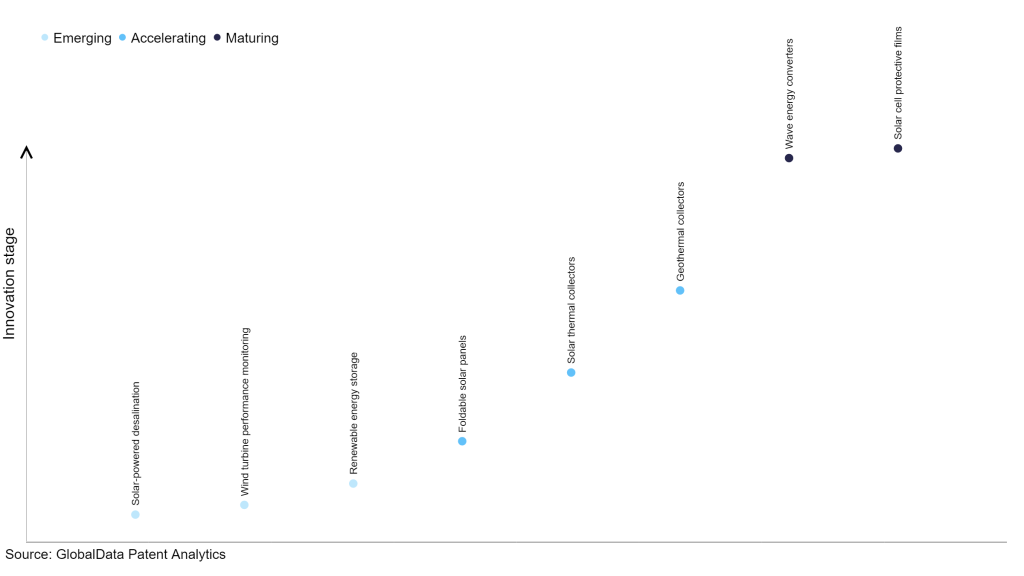In terms of application diversity, MicroLink Devices leads the pack, while Positec Power Tools (Suzhou) and Gandini stood in the second and third positions, respectively. By means of geographic reach, Sofibol held the top position, followed by Schneider Electric and Fronius International.
To further understand the key themes and technologies disrupting the power industry, access GlobalData’s latest thematic research report on ESG (Environmental, Social, and Governance) in Power.

Discover B2B Marketing That Performs
Combine business intelligence and editorial excellence to reach engaged professionals across 36 leading media platforms.
The power industry continues to be a hotbed of patent innovation. Activity is driven by the need for more sustainable energy sources and a reduction in reliance on fossil fuels, and growing importance of technologies such as solar energy, electric vehicles (EVs) and related infrastructure. In the last three years alone, there have been over 695,000 patents filed and granted in the power industry, according to GlobalData’s report on Environmental sustainability in power: solar-powered charging stations. Buy the report here.
However, not all innovations are equal and nor do they follow a constant upward trend. Instead, their evolution takes the form of an S-shaped curve that reflects their typical lifecycle from early emergence to accelerating adoption, before finally stabilizing and reaching maturity.
Identifying where a particular innovation is on this journey, especially those that are in the emerging and accelerating stages, is essential for understanding their current level of adoption and the likely future trajectory and impact they will have.
45+ innovations will shape the power industry
According to GlobalData’s Technology Foresights, which plots the S-curve for the power industry using innovation intensity models built on over 83,000 patents, there are 45+ innovation areas that will shape the future of the industry.
Within the emerging innovation stage, solar-powered desalination, wind turbine performance monitoring and renewable energy storage are disruptive technologies that are in the early stages of application and should be tracked closely. Foldable solar panels, solar thermal collectors, and geothermal collectors are some of the accelerating innovation areas, where adoption has been steadily increasing. Among maturing innovation areas are wave energy converters and solar cell protective films, which are now well established in the industry.
Innovation S-curve for environmental sustainability in the power industry

Solar-powered charging stations is a key innovation area in environmental sustainability
Solar-powered charging stations are the most reliable way to charge any electric car with solar energy, which ensures enough charge to the owner of the electric vehicle until he/she reaches home and fully recharges the electric vehicle.
GlobalData’s analysis also uncovers the companies at the forefront of each innovation area and assesses the potential reach and impact of their patenting activity across different applications and geographies. According to GlobalData, there are 135+ companies, spanning technology vendors, established power companies, and up-and-coming start-ups engaged in the development and application of solar-powered charging stations.
Key players in solar-powered charging stations – a disruptive innovation in the power industry
‘Application diversity’ measures the number of applications identified for each patent. It broadly splits companies into either ‘niche’ or ‘diversified’ innovators.
‘Geographic reach’ refers to the number of countries each patent is registered in. It reflects the breadth of geographic application intended, ranging from ‘global’ to ‘local’.
Toyota Motor, Kia, Hyundai Motor, Panasonic, and Hitachi are among the key patent filers in electric vehicle charging systems. Hitachi announced a sustainable mobility partnership with Clever to ensure Denmark's EV adoption is powered by 24/7 renewable electricity with advanced energy management and optimization solutions, underpinned with industrial-scale energy storage. Delta recently announced its new EV charging management system, DeltaGrid® EVM, an innovative platform featuring artificial intelligence (AI) capabilities and seamless integration with energy infrastructure (solar energy and energy storage).
Other key patent filers in the EV charging industry include Beam Global and Honda Motor.
In terms of application diversity, MicroLink Devices leads the pack, while Positec Power Tools (Suzhou) and Gandini stood in the second and third positions, respectively. By means of geographic reach, Sofibol held the top position, followed by Schneider Electric and Fronius International.
To further understand the key themes and technologies disrupting the power industry, access GlobalData’s latest thematic research report on ESG (Environmental, Social, and Governance) in Power.
Data Insights
From

The gold standard of business intelligence.
Blending expert knowledge with cutting-edge technology, GlobalData’s unrivalled proprietary data will enable you to decode what’s happening in your market. You can make better informed decisions and gain a future-proof advantage over your competitors.




